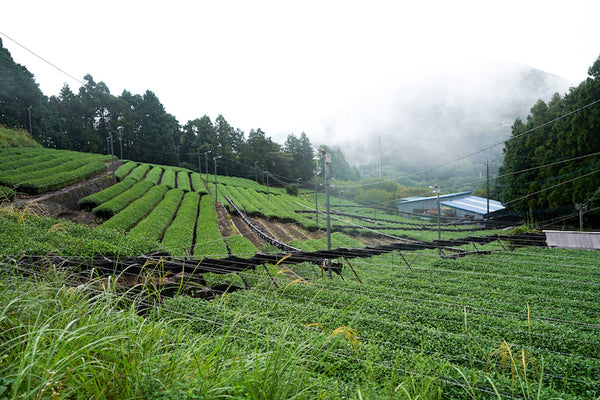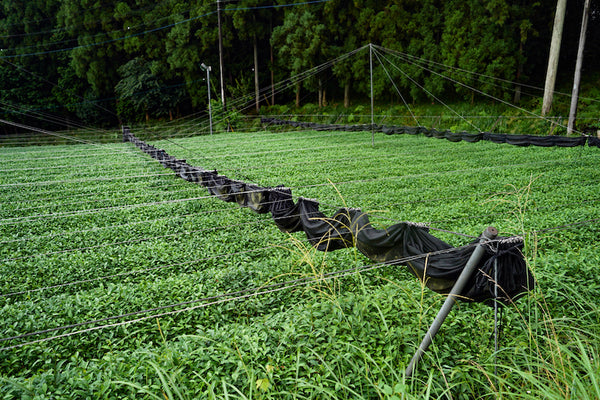Producer Spotlight - Kanagawa Nokyō Chaba Center: Ashigara-cha Tea for Your Soul
In the heart of the Tanazawa and Hakodate mountain ranges there grows a special, full-bodied variety of tea. This tea is nurtured by the cold winds of late December to early February. These winds crawl up from the foot of the mountains and blow their chilly seasonal breeze, shifting temperatures drastically as day becomes night, and night becomes day.
It is in this mountainous region where the indelible scenery of old Japan remains, that a tea as good for quenching your thirst as it is for warming your soul, is cultivated by the skilled hands of local farmers and artisans. Synonymous across Japan with taste and aroma, this tea is Ashigara-cha.
Rather than a single strain of tea plant, Ashigara-cha is the general name given to tea grown throughout Kanagawa prefecture that has been processed in the Ashigara area. The Kanagawa Nōkyō Chaba Center creates their own Ashigara-cha using strict quality control standards
Rich in umami-filled amino acids and nitrogen—an industry standard measure of quality—Ashigara-cha is low in astringent tannins and fiber, making the tea’s taste and aroma quite prominent. It has been recognized in national tea competitions as the highest quality tea for multiple years running and is recognized as one of Kanagawa’s 100 famous products.
However, Ashigara-cha wouldn’t be what it is today without the efforts of everyone involved at the Kanagawa Nōkyō Chaba Center. This center is an agricultural cooperative with its origins in 1965, made to support local tea farmers and build a unified tea production region within the foothills of the Tanzawa mountains.
It is said that everything began following the Great Kantō Earthquake of 1923. The mountain villages and towns of the Ashigara area suffered heavy damage and were slow to recover. But with the direction of passionate pioneers and the incredible local conditions for tea cultivation, reconstruction efforts and agricultural improvement projects in years following the earthquake set the foundations for what would become the first unified agricultural tea cooperative in Japan.

An Ashigara cha tea field
The Kanagawa Nōkyō Chaba Center operates using a unique system, one developed to protect both the consumers and the producers. In this system, all of the raw tea harvested in the various production areas across Kanagawa is collected and purchased by the Kanagawa Nōkyō Chaba Center and then processed, blended, packaged, and sold directly through various outlets including agricultural co-ops, co-op stores, local supermarkets, and direct online sales. Since the tea is collected from different fields, it can be difficult to unify the various quantities, quality and conditions. In order to maintain fairness, the price is determined by a third party tea master. As for the quality, the tea is first divided into 11 grades, and then processed according to each grade.

Ashigara cha Direct Shop

Ashigara cha Direct Shop
By creating this unified production area and focusing on planned production, the Kanagawa Nōkyō Chaba Center and its producers are able to form an integrated system of high-quality tea and stable tea cultivation. Key to this system’s success are the advanced cultivation and production techniques, as well as the direct consumer-oriented sales approach. Given that other distributors purchase and sell based on past performance, the Kanagawa Nōkyō Chaba Center type of prefecture-wide unified tea production group sales system was unprecedented in Japan. However, it has proven to be quite successful by consistently providing customers with high-quality, safe Ashigara-cha and supporting tea producers and farmers with stable revenue.
Ashigara-cha varieties
Ashigara-cha is not one single variety of tea, but six varieties grown throughout Kanagawa. Each of the six have their own histories, special traits, and characteristics:
- Yabukita is the fastest growing variety of the six and is known for its well-rounded excellence, having a uniquely strong aroma and an elegant, refined flavor with a rich sweetness. It accounts for 80% of the entire country’s tea production.
- Asatsuyu is known for its exceptionally high quality and lustrous green color that matches the depth of its umami rich taste. Although the asatsuyu tea plant is rather hardy, it has a lower harvest yield.
- Okumidori is related to yabukita but has a later harvest season and a similarly high harvest yield. It is known for its deep green color and refreshing, invigorating flavor.
- Saemidori is a cross between yabukita and asatsuyu and is often the first tea of the season, with a shiny, clear luster and fresh green color to match its refined aroma and umami-rich taste.
- Yamanoibuki is another offshoot of yabukita, though it has a lighter green lustrous color, and like saemidori is low in astringency and high in umami.
- Tsuyuhikari is related to asatsuyu and has a slightly yellow-green color. It’s known for its light, aromatic fragrance.

Black fabric is used to create shade from the sunlight in order to make gyokuro tea
Mr. Moriya - sales representative of Kanagawa Nōkyō Chaba Center
We met with Mr. Moriya, sales representative of Kanagawa Nōkyō Chaba Center. Mr. Moriya has been involved in the production, sales, and management of Ashigara tea for 23 years. He also grows his own tea at his parents' home in Odawara city in Kanagawa and ships it to Kanagawa Nōkyō Chaba Center.

Tea grower and sales representative, Mr. Moriya
"In this fast-paced world, we are less likely to brew tea and drink it slowly, like we did before. I feel the demand for tea bags and aluminum cans, which are easier to recycle than plastic bottles, is increasing. As for matcha, we would like to sell products that are conveinite and can be consumed anywhere, such as providing mini shakers together with matcha." - Mr. Moriya
Kanagawa Nōkyō Chaba Center
Web: https://www.ashigaracha.co.jp
Location: https://goo.gl/maps/iaUvaaGX11s5TDDq7





